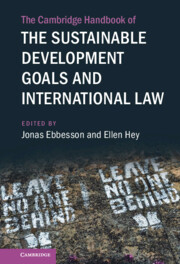Book contents
- The Cambridge Handbook of the Sustainable Development Goals and International Law
- The Cambridge Handbook of the Sustainable Development Goals and International Law
- Copyright page
- Contents
- Contributors
- Preface
- Abbreviations
- Introduction: The Sustainable Development Goals, Agenda 2030, and International Law
- 1 SDG 1: End Poverty in All Its Forms Everywhere
- 2 SDG 2: End Hunger, Achieve Food Security and Improved Nutrition and Promote Sustainable Agriculture
- 3 SDG 3: Ensure Healthy Lives and Promote Well-Being for All at All Ages
- 4 SDG 4: Ensure Inclusive and Equitable Quality Education and Promote Lifelong Learning Opportunities for All
- 5 SDG 5: Achieve Gender Equality and Empower All Women and Girls
- 6 SDG 6: Ensure Availability and Sustainable Management of Water and Sanitation for All
- 7 SDG 7: Ensure Access to Affordable, Reliable, Sustainable and Modern Energy for All
- 8 SDG 8: Promote Sustained, Inclusive and Sustainable Economic Growth, Full and Productive Employment and Decent Work for All
- 9 SDG 9: Build Resilient Infrastructure, Promote Inclusive and Sustainable Industrialization and Foster Innovation
- 10 SDG 10: Reduce Inequality within and among Countries
- 11 SDG 11: Make Cities and Human Settlements Inclusive, Safe, Resilient and Sustainable
- 12 SDG 12: Ensure Sustainable Consumption and Production Patterns
- 13 SDG 13: Take Urgent Action to Combat Climate Change and Its Impacts
- 14 SDG 14: Conserve and Sustainably Use the Oceans, Seas and Marine Resources for Sustainable Development
- 15 SDG 15: Protect, Restore and Promote Sustainable Use of Terrestrial Ecosystems, Sustainably Manage Forests, Combat Desertification, and Halt and Reverse Land Degradation and Halt Biodiversity Loss
- 16 SDG 16: Promote Peaceful and Inclusive Societies for Sustainable Development, Provide Access to Justice for All and Build Effective, Accountable and Inclusive Institutions at All Levels
- 17 SDG 17: Strengthen the Means of Implementation and Revitalize the Global Partnership for Sustainable Development
- Index
7 - SDG 7: Ensure Access to Affordable, Reliable, Sustainable and Modern Energy for All
Published online by Cambridge University Press: 23 September 2022
- The Cambridge Handbook of the Sustainable Development Goals and International Law
- The Cambridge Handbook of the Sustainable Development Goals and International Law
- Copyright page
- Contents
- Contributors
- Preface
- Abbreviations
- Introduction: The Sustainable Development Goals, Agenda 2030, and International Law
- 1 SDG 1: End Poverty in All Its Forms Everywhere
- 2 SDG 2: End Hunger, Achieve Food Security and Improved Nutrition and Promote Sustainable Agriculture
- 3 SDG 3: Ensure Healthy Lives and Promote Well-Being for All at All Ages
- 4 SDG 4: Ensure Inclusive and Equitable Quality Education and Promote Lifelong Learning Opportunities for All
- 5 SDG 5: Achieve Gender Equality and Empower All Women and Girls
- 6 SDG 6: Ensure Availability and Sustainable Management of Water and Sanitation for All
- 7 SDG 7: Ensure Access to Affordable, Reliable, Sustainable and Modern Energy for All
- 8 SDG 8: Promote Sustained, Inclusive and Sustainable Economic Growth, Full and Productive Employment and Decent Work for All
- 9 SDG 9: Build Resilient Infrastructure, Promote Inclusive and Sustainable Industrialization and Foster Innovation
- 10 SDG 10: Reduce Inequality within and among Countries
- 11 SDG 11: Make Cities and Human Settlements Inclusive, Safe, Resilient and Sustainable
- 12 SDG 12: Ensure Sustainable Consumption and Production Patterns
- 13 SDG 13: Take Urgent Action to Combat Climate Change and Its Impacts
- 14 SDG 14: Conserve and Sustainably Use the Oceans, Seas and Marine Resources for Sustainable Development
- 15 SDG 15: Protect, Restore and Promote Sustainable Use of Terrestrial Ecosystems, Sustainably Manage Forests, Combat Desertification, and Halt and Reverse Land Degradation and Halt Biodiversity Loss
- 16 SDG 16: Promote Peaceful and Inclusive Societies for Sustainable Development, Provide Access to Justice for All and Build Effective, Accountable and Inclusive Institutions at All Levels
- 17 SDG 17: Strengthen the Means of Implementation and Revitalize the Global Partnership for Sustainable Development
- Index
Summary
The global strategic priorities articulated in Sustainable Development Goal (SDG) 7, Affordable and Clean Energy, underscore a narrative of two ‘economies’ and the conscious evolution of political prioritization in economic structuring. SDG 7 represents an aspiration to move away from the ‘old’, entrenched, ‘brown’ economic activities that developed out of the Industrial Revolution, built upon conventional fossil fuels and exhaustible natural resources, and towards ‘new’, low-, or zero-carbon-based ‘green’ economic activities that are built upon clean energy, electrification, and the decarbonization of all aspects of modern life. This narrative gives rise to numerous legal complexities and challenges for international law, derived from its structure, content, and functions related to energy activities. This chapter first explores the content of SDG 7. It then surveys the international rules and processes that may assist and/or hinder the progressive realization of SDG 7. The chapter closes by considering the role and influence of selected international institutions and non-state actors in advancing and implementing SDG 7.
SDG 7, sustainable energy, energy poverty, human rights, climate change, trade and investment, global governance, international institutions, non-state actors
- Type
- Chapter
- Information
- Publisher: Cambridge University PressPrint publication year: 2022



